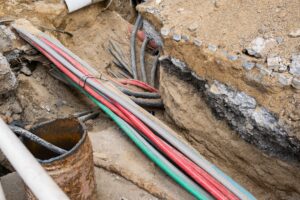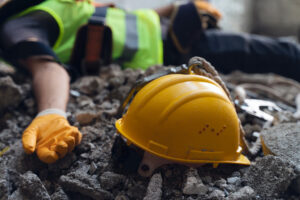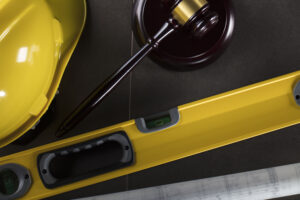Workers’ Comp Claims for Construction Workers: What You Need to Know
Workers’ Comp Claims for Construction Workers: What You Need to Know
 Construction is one of the most dangerous industries to work in, with a high rate of on-the-job injuries. If you or a loved one has suffered an injury in a construction accident, it’s important to understand your rights and options for seeking compensation.
Construction is one of the most dangerous industries to work in, with a high rate of on-the-job injuries. If you or a loved one has suffered an injury in a construction accident, it’s important to understand your rights and options for seeking compensation.
A Santa Ana construction accident lawyer can file a workers’ comp claim for you and seek the full benefits you are entitled to.
Schedule a Free Initial Consultation Today!
Common Construction Accidents and Injuries
Construction workers face a wide range of hazards on the job that can lead to serious injuries.
Some of the most common types of construction accidents include:
Falls from Heights
Construction workers often have to work high off the ground on scaffolding, ladders, or roofs. This puts them at risk of falling and getting badly hurt. Even a fall from a few feet can cause broken bones or head injuries. Workers can fall if scaffolding is not put together properly, if a ladder is unsteady, or if they slip on a roof.
Being Hit by Falling Objects
Construction sites involve moving a lot of tools, materials, and equipment overhead. If something falls and hits a worker, it can cause serious injuries. Workers can be hit by falling bricks, tools dropped by another worker, or even large beams or walls that collapse.
Electrical Hazards

Construction sites have many electrical wires and equipment. If these are not handled properly, workers can suffer electrical injuries. This can happen if a worker touches an exposed wire, the equipment is not grounded correctly, or electrical lines are not marked before digging. Electrical accidents can cause burns, nerve damage, and even death.
Trench Collapses
Construction workers often have to dig trenches for foundations or to lay pipes. These trenches can be very deep. If the sides of the trench are not supported correctly, they can cave in and bury workers. A trench collapse can suffocate a worker or cause crush injuries.
Heavy Machinery Accidents
Construction sites use many big, heavy machines, such as forklifts, cranes, and bulldozers. If these machines are not operated safely, they can cause serious accidents. A worker can get run over, get caught in the machine’s moving parts, or be hit by something the machine is lifting or moving.
Repetitive Motion Injuries
Some construction work requires repeating the same motions, like using a jackhammer or operating a vibrating tool. Over time, these repeated motions can cause pain and injuries to the hands, arms, or shoulders. These types of injuries are called repetitive motion injuries or repetitive stress injuries.
Exposure to Toxic Substances
Construction workers can come into contact with various chemicals and other dangerous materials on the job. For example, they might work with asbestos when demolishing an old building, sand, or cut materials containing lead. Breathing in these toxic substances over time can cause serious health problems, such as lung diseases or cancer.
The Importance of Seeking Immediate Medical Treatment
If you’ve suffered an injury on a construction site, your top priority should be getting the medical care you need. Even if your injuries seem minor at first, it’s wise to get checked out by a doctor as soon as possible. Some injuries, like concussions or internal bleeding, may not show symptoms right away but can become life-threatening if left untreated.
Seeking prompt medical attention is also important for your workers’ comp claim. Insurance companies will look for any reason to deny or minimize your benefits. If you wait too long to see a doctor, the insurer may argue that your injuries are not work-related or less severe than you claim. Going to the doctor right after your accident creates a clear record linking your injuries to the on-the-job incident.
When you see the doctor, be sure to inform them that your injuries are work-related. Give them a full account of how the accident happened and all the symptoms you are experiencing.
Understanding Your Workers’ Comp Benefits
Most construction workers are covered by their employer’s workers’ compensation insurance. Workers’ comp is a no-fault system, meaning you are entitled to benefits regardless of who was at fault for your accident (with a few exceptions). In exchange for this coverage, you typically cannot sue your employer for additional damages.
Workers’ comp benefits can include:
Medical Expenses
If you get hurt on the job, workers’ comp insurance should pay for all the medical care you need to treat your injury. This includes things like:
- Seeing a doctor or going to the hospital
- Having surgery if you need it
- Getting medication prescribed by your doctor
- Using medical equipment like crutches or a wheelchair
Your employer’s insurance company may have certain doctors you need to see for treatment. This is called a medical provider network. Following the rules about seeing doctors in this network is important, or the insurance company might not pay for your care.
Lost Wages Benefits
Getting hurt at work doesn’t just affect your health – it can also make it hard to pay your bills if you can’t work. That’s where lost income benefits come in. If your injury keeps you from working for more than a few days, you can get part of your usual paycheck through workers’ comp.
Usually, you can get about two-thirds of what you normally make. So, if you usually earn $900 a week, you’d get around $600 a week in lost income benefits. You can keep getting these payments until you’re healthy enough to return to your job.
Permanent Disability Payments
Some injuries are so serious that they leave you with lasting health problems, even after you’ve gotten treatment. If your injury causes a permanent disability that makes it hard for you to work, you can seek permanent disability benefits.
Permanent disability means you have a lasting condition – it doesn’t have to mean you can never work again. But if your condition limits what kinds of jobs you can do or how much you can work, you can get payments to make up for the money you’re unable to earn.
The amount you get for permanent disability depends on how severe your condition is. The worse your disability, the more money you can receive.
Vocational Rehabilitation Services
What if your injury makes it impossible for you to return to your old job? Workers’ comp may pay for job training or other services to help you find a new career. This is called vocational rehabilitation.
For example, you hurt your back and can’t do construction work anymore. You might need training to work in an office or do a less physically demanding job. A vocational rehabilitation counselor can help you determine what jobs you can do and what kind of training you need. Workers’ comp will then pay for that training so you can start a new chapter in your work life.
Death Benefits for Families
Sadly, some construction accidents are deadly. If a worker dies on the job, their husband or wife and children can get death benefits through workers’ comp.
Death benefits give families money to help pay for a funeral and burial. They also provide ongoing payments to make up for the money the worker would have earned to support the family. The amount of death benefits depends on things like how much the worker made and how many children they had.
Nothing can bring back a loved one who died on the job. But death benefits can at least give grieving families some financial stability as they face such a tragic loss. A workers’ comp lawyer can help families understand what benefits they can receive during such a difficult time.
Protecting Your Rights After a Construction Accident

In addition to seeking medical treatment, there are several steps you should take to protect your right to workers’ comp benefits after a construction accident:
- Report the accident to your employer: Notify your supervisor about the accident as soon as possible, ideally in writing. Most states have deadlines for reporting work injuries, often within a few days of the incident. If you wait too long, you can lose your right to benefits.
- File a workers’ comp claim: Your employer should provide you with the necessary forms to file a workers’ comp claim. Be sure to fill out the forms completely and accurately and submit them to the appropriate parties (usually your employer and the workers’ comp board). Keep copies of everything you submit.
- Keep detailed records: Write down everything you can remember about the accident, including when and where it occurred, what you were doing, and who witnessed it. Keep track of all medical treatment you receive and any out-of-pocket expenses like prescriptions or travel to appointments.
- Be cautious when speaking with insurance adjusters: The workers’ comp insurance company may contact you for a statement about the accident. Be polite but cautious in your communications. Stick to the facts and avoid speculating about fault or downplaying your injuries. Better yet, refer the adjuster to your attorney.
- Speak with a construction accident lawyer: Consulting with an experienced workers’ comp attorney is one of the best ways to protect your rights and ensure you receive the full benefits you deserve. A lawyer can gather evidence, negotiate with the insurance company, and represent you at hearings if necessary.
Third-Party Liability Claims
In some cases, construction accidents are caused by the negligence of someone other than your employer, such as a subcontractor, property owner, or equipment manufacturer. In these situations, you can file a separate personal injury lawsuit against the at-fault party in addition to your workers’ comp claim. This is known as a third-party liability claim.
Third-party claims can provide additional compensation beyond what workers’ comp covers, including damages for pain and suffering, emotional distress, and loss of enjoyment of life. However, they also require proving that the other party was negligent in causing your injuries.
Some common examples of third-party liability in construction accidents include:
- A subcontractor fails to properly secure scaffolding, causing you to fall
- A property owner fails to warn of a dangerous condition on the job site
- A defective piece of equipment malfunctions and injures you
- A negligent driver hits you while you are working in a highway construction zone
Identifying and pursuing third-party claims can be complex, as multiple parties may be involved and competing areas of law at play. An experienced construction accident attorney can help you determine if you have a viable third-party claim and build a strong case for maximum compensation.
The Value of Hiring a Construction Accident Attorney
The days after a construction accident can feel overwhelming, especially when you are dealing with painful injuries, mounting medical bills, and the stress of being out of work. You may feel pressure to accept whatever settlement the insurance company offers just to get by.
 However, it’s important to remember that insurance companies are in business to make money, not to look out for your best interests. They may use tactics to minimize or deny your claim, such as arguing that your injury is not work-related or that you have a pre-existing condition. Without legal representation, you may not know how to effectively counter these arguments and get the benefits you are entitled to.
However, it’s important to remember that insurance companies are in business to make money, not to look out for your best interests. They may use tactics to minimize or deny your claim, such as arguing that your injury is not work-related or that you have a pre-existing condition. Without legal representation, you may not know how to effectively counter these arguments and get the benefits you are entitled to.
This is where hiring a lawyer can make all the difference. An experienced construction accident attorney can:
- Thoroughly investigate your accident to gather evidence of negligence or OSHA violations
- Handle all communications and negotiations with the insurance company on your behalf
- Ensure your claim is filed properly and on time
- Identify any potential third-party liability claims
- Fight for your right to full and fair compensation, including through litigation if necessary
- Provide guidance and support throughout the entire process
A good construction accident lawyer will have a deep understanding of the laws and regulations surrounding workers’ comp claims and personal injury lawsuits. They can anticipate and counter the tactics insurance companies use to minimize payouts. Importantly, most operate on a contingency fee model. They only get paid if they succeed with your case.
Contact a Dedicated Construction Accident Attorney
Don’t try to go through this stressful process on your own. Contact a dedicated construction accident lawyer today to discuss your case and learn how they can fight for you. With a lawyer’s help, you can focus on your recovery while they work to secure the financial resources you need to move forward. You have rights – let an experienced attorney help you assert them.


